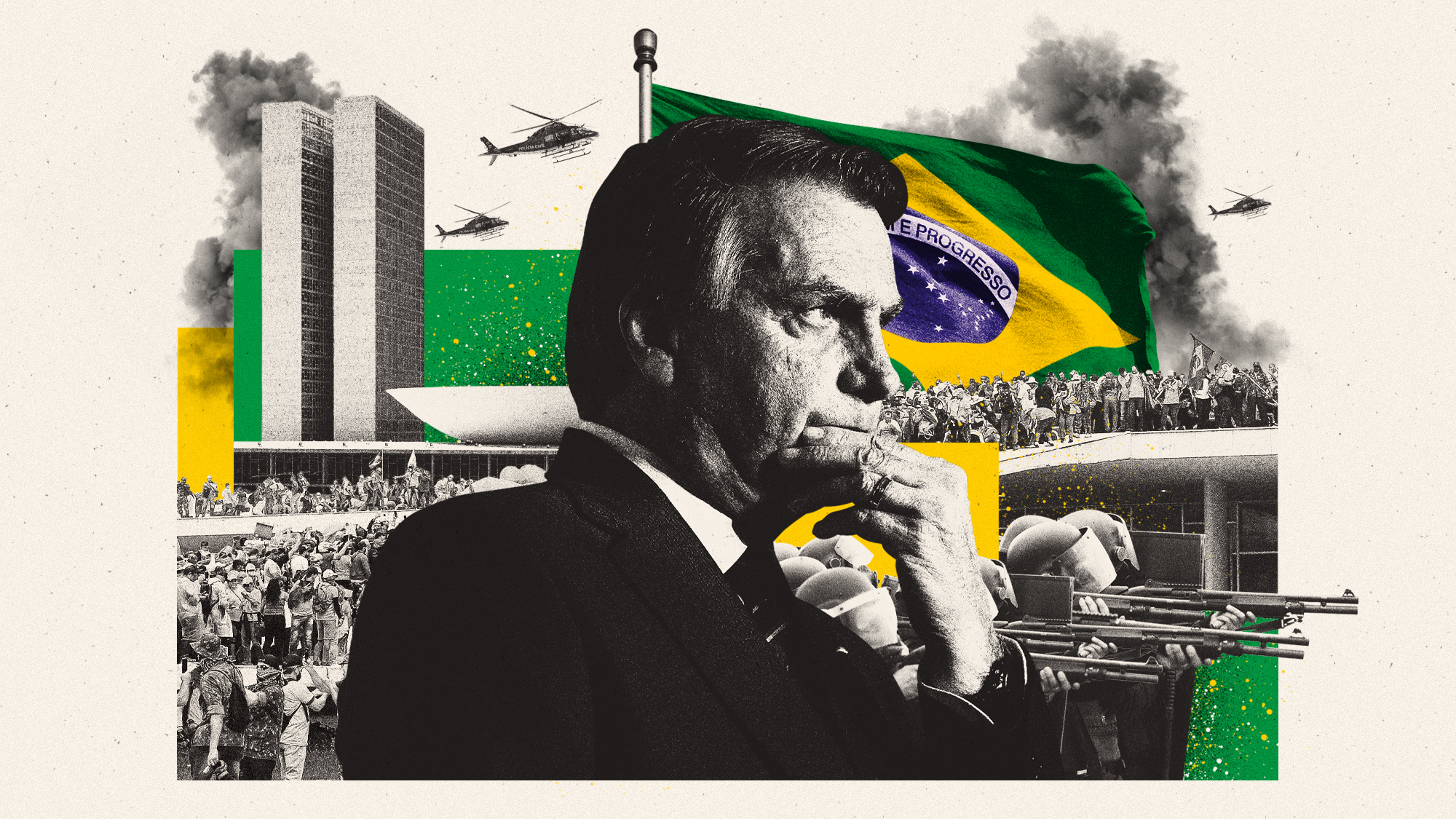The trial of Jair Bolsonaro, the 'Trump of the tropics'
Brazil's former president will likely be found guilty of attempting military coup, despite US pressure and Trump allegiance

A free daily email with the biggest news stories of the day – and the best features from TheWeek.com
You are now subscribed
Your newsletter sign-up was successful
The closing phase of the trial of Brazil's former president Jair Bolsonaro – dubbed the "Trump of the tropics" – begins today: the first case of its kind in the country's turbulent history.
The popular far-right figure is accused of plotting to overthrow his left-wing rival, President Luiz Inácio Lula da Silva, after losing his bid for re-election in 2022. The full ruling, by five judges in Brasília's Federal Supreme Court, is expected to be delivered by 12 September. A guilty verdict could send Bolsonaro to jail for decades, and further inflame his idol to the north, Donald Trump.
What is Bolsonaro accused of?
Attempting to use military force to overthrow democracy. After narrowly losing the presidential run-off against Lula in October 2022, Bolsonaro "declared the ballot rigged", said The Economist, and "used social media to urge his supporters to rise up". He allegedly tried to persuade military leaders to back a "correction" of the election, but failed to get enough support and left for the US.
The Week
Escape your echo chamber. Get the facts behind the news, plus analysis from multiple perspectives.

Sign up for The Week's Free Newsletters
From our morning news briefing to a weekly Good News Newsletter, get the best of The Week delivered directly to your inbox.
From our morning news briefing to a weekly Good News Newsletter, get the best of The Week delivered directly to your inbox.
On 8 January 2023, thousands of Bolsonaro's supporters attacked key government buildings in an echo of the 6 January attacks on the US Capitol in 2021. A federal investigation into the riots found evidence of a "criminal organisation" that had "acted in a coordinated manner" to keep Bolsonaro in power. The report alleged that Bolsonaro planned the attempted coup, which included a plot to assassinate Lula.
What does Bolsonaro say?
The former president and his alleged co-conspirators deny the charges, calling them "grave and baseless". He claims to be a victim of political persecution, but has admitted considering "alternative" ways of holding on to power after his defeat.
Bolsonaro insists he will challenge Lula for the presidency in next year's election, but the Supreme Court has banned him from seeking office until 2030 for spreading disinformation about Brazil's voting system. He was also placed under house arrest in August after violating a court order banning him from using social media.
How is Donald Trump involved?
Trump is Bolsonaro's "most powerful foreign friend", said The Guardian. The US president has "waded into the courtroom drama", imposing 50% tariffs on Brazilian imports in retaliation for what he calls a "witch hunt" against his ally.
A free daily email with the biggest news stories of the day – and the best features from TheWeek.com
His administration has also imposed Magnitsky sanctions on Alexandre de Moraes, the judge leading the case against Bolsonaro – measures usually reserved for those accused of "gross" human rights abuses.
Bolsonaro's son, congressman Eduardo, has relocated to the US and "busied himself lobbying Trump officials to target Brazil's top tribunal and Lula allies". But analysts believe the "US coercion campaign will fail to sway the judges".
Last week Brazilian police recommended more charges against Bolsonaro and his son, accusing them of obstruction of justice and interfering with the trial, citing Eduardo's meetings with White House officials. "Brazil will not give in to pressure," Moraes told The Washington Post last month. Brazil is "independent".
Why is the trial so significant?
Bolsonaro and his co-defendants, including a military admiral and three generals, are likely to be found guilty, which could exacerbate Brazil's febrile political landscape.
Brazil has endured 14 coup attempts and a brutal military dictatorship from 1964 to 1985 – a living memory for many. However, the country has "traditionally chosen conciliation over prosecution when it comes to alleged crimes against the democratic state".
But when democracy was restored, Brazil "began building a legislative framework to prevent another backslide into authoritarianism". These laws are "the basis for the charges against Bolsonaro".
Harriet Marsden is a senior staff writer and podcast panellist for The Week, covering world news and writing the weekly Global Digest newsletter. Before joining the site in 2023, she was a freelance journalist for seven years, working for The Guardian, The Times and The Independent among others, and regularly appearing on radio shows. In 2021, she was awarded the “journalist-at-large” fellowship by the Local Trust charity, and spent a year travelling independently to some of England’s most deprived areas to write about community activism. She has a master’s in international journalism from City University, and has also worked in Bolivia, Colombia and Spain.